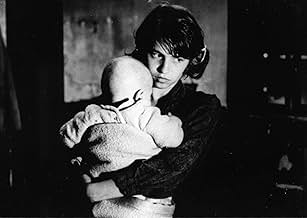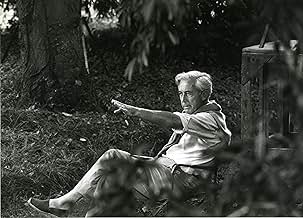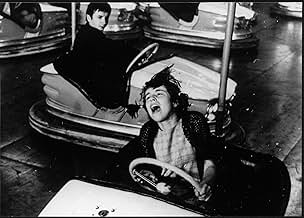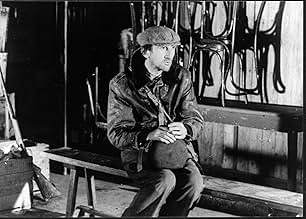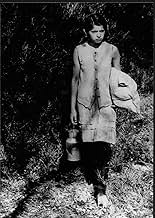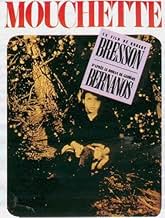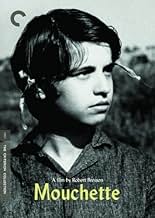VALUTAZIONE IMDb
7,7/10
13.692
LA TUA VALUTAZIONE
Una ragazza che vive nella campagna francese subisce continue umiliazioni, si trova costretta a lavorare per mantenere il fratellino, la madre è malata e il padre alcolizzato. Sopravvive fin... Leggi tuttoUna ragazza che vive nella campagna francese subisce continue umiliazioni, si trova costretta a lavorare per mantenere il fratellino, la madre è malata e il padre alcolizzato. Sopravvive finché un giorno viene violentata da un bracconiere.Una ragazza che vive nella campagna francese subisce continue umiliazioni, si trova costretta a lavorare per mantenere il fratellino, la madre è malata e il padre alcolizzato. Sopravvive finché un giorno viene violentata da un bracconiere.
- Regia
- Sceneggiatura
- Star
- Premi
- 5 vittorie e 1 candidatura in totale
Recensioni in evidenza
Until now Robert Bresson has been one of those classic directors who have failed to connect with me. With Au Hasard Balthazar and Pickpocket, I've found his style over-simplified, bland and plodding. While Balthazar didn't work for me at all, Pickpocket had moments where it showed potential but then it was quickly squandered and taken in a different direction. Here with Mouchette, his style is finally working. It's a film utterly drenched in sorrow and pain. Through the protagonists' squirming and rebelling from her struggles, her actions are a catharsis from the frustrations of life and when she's punished for them, it digs deep. Although the storytelling techniques are similar to the films I didn't care much for, what elevates Mouchette is the passionate performances and the crisp photography. While I do regret that it's so brief, Mouchette is a brilliant portrayal of a truly tragic figure that faces the hardships and inevitable moral dilemmas of life. I'm very glad Bresson has warmed up to me as he's got many films I'm really looking forward to, such as A Man Escaped and Lancelot du Lac.
8/10
8/10
Never before has cinema been this simple and honest. No one makes films with more emotion than Bresson and no one puts less emotion in their films than he. I could cite so many Bressonian cliches and talk of his uniquely personal style which by 1967 was firmly established, especially since he had abandoned the voice-over he used in the 50s. I will point out his use of sound and approach to acting which remain so distinctive and by now so familiar. There is nothing in Mouchette that is new, especially after Balthazar, what remains is the story of Mouchette, told with the utter grace and passion that makes this film a masterpiece that transcends technique, even cinema itself, and makes most cinema look frivolous in the process.
Finally I must mention the films ending, which I rank with that of Balthazar as the most beautiful I have seen.
Finally I must mention the films ending, which I rank with that of Balthazar as the most beautiful I have seen.
It seems entirely appropriate that the film opens with the metaphor of birds being snared as this seems to apply not only to Mouchette's life, but to Bresson's approach to the viewer as well.
For what, after all, is the director attempting to do here? Are we really to regard this as an unblinking gaze into the life of an abused, outcast girl? If so, why is Bresson so intent on excluding even the most fleeting moments of joy (or at least humor) that enter even the darkest of lives (I believe a philosopher once said "alas, joy too must have its day")? It is pretty telling that the one scene involving happiness for Mouchette is the most monotonous and lifeless in the picture (the bumper cars). Not only are we not allowed to experience her joy, but Bresson is careful to distance us from the real experience of her pain as well. This is done by the use of "gestures" (particularly prominent in Bresson's later films) that "signify" a character's experience rather than giving us the person's individualized emotional and visceral reactions to events. Thus the assault on Mouchette is shown in a distant, almost pantomimed manner, her relationship with her father is suggested by dropping coins in his hand, a disembodied hand slapping her face, etc. So, are we really to identify with Mouchette, to feel her pain, seeing how her experience of life intersects with our own in only the most symbolic, muted fashion? Is this really "compassion" and is this really Bresson's purpose?
Or is Mouchette a figure that Bresson uses (and dehumanizes), as literally every character in the movie uses her, to achieve other purposes? In this case the selling of a particular view of the world. One which sees the world as a snare, both in its joy and its pain, that is "saved" only by the (symbolic) suffering of the innocent, and transcended/transformed only by death. In other words a viewpoint that that advocates looking beyond (or turning away from)life to find "transcendent" truths. A view based on judgement rather than acceptance. And if this is "the truth" why must so much of what we experience as truth (such as joy, intimacy, occasional feelings of "oneness" with the world) be so forcibly excluded? Are these all really illusions, the world simply a snare? And without acceptance of ALL of Mouchette's reality can she,or any of us, really be redeemed?
Yes, Bresson is a meticulous, incisive, and occasionally powerful filmaker. But is he really honest? Are there some TRUTHS that he can't face (and so desperately restricts his view). In MOUCHETTE we are a little more aware of the puppeteer's strings than usual. 7 out of 10.
For what, after all, is the director attempting to do here? Are we really to regard this as an unblinking gaze into the life of an abused, outcast girl? If so, why is Bresson so intent on excluding even the most fleeting moments of joy (or at least humor) that enter even the darkest of lives (I believe a philosopher once said "alas, joy too must have its day")? It is pretty telling that the one scene involving happiness for Mouchette is the most monotonous and lifeless in the picture (the bumper cars). Not only are we not allowed to experience her joy, but Bresson is careful to distance us from the real experience of her pain as well. This is done by the use of "gestures" (particularly prominent in Bresson's later films) that "signify" a character's experience rather than giving us the person's individualized emotional and visceral reactions to events. Thus the assault on Mouchette is shown in a distant, almost pantomimed manner, her relationship with her father is suggested by dropping coins in his hand, a disembodied hand slapping her face, etc. So, are we really to identify with Mouchette, to feel her pain, seeing how her experience of life intersects with our own in only the most symbolic, muted fashion? Is this really "compassion" and is this really Bresson's purpose?
Or is Mouchette a figure that Bresson uses (and dehumanizes), as literally every character in the movie uses her, to achieve other purposes? In this case the selling of a particular view of the world. One which sees the world as a snare, both in its joy and its pain, that is "saved" only by the (symbolic) suffering of the innocent, and transcended/transformed only by death. In other words a viewpoint that that advocates looking beyond (or turning away from)life to find "transcendent" truths. A view based on judgement rather than acceptance. And if this is "the truth" why must so much of what we experience as truth (such as joy, intimacy, occasional feelings of "oneness" with the world) be so forcibly excluded? Are these all really illusions, the world simply a snare? And without acceptance of ALL of Mouchette's reality can she,or any of us, really be redeemed?
Yes, Bresson is a meticulous, incisive, and occasionally powerful filmaker. But is he really honest? Are there some TRUTHS that he can't face (and so desperately restricts his view). In MOUCHETTE we are a little more aware of the puppeteer's strings than usual. 7 out of 10.
... all suffered by a young girl and presented through the unique lens of Robert Bresson. A timeless story that could be replicated the world over today sadly, either we don't learn or we don't care and while that's the case, the Mouchettes of this world will be forever pulled under.
My Rating : 9/10
Bresson is heralded as an important filmmaker in world cinema. I absolutely love 'Mouchette' and it is a masterpiece of world cinema. It was on Tarkovsky's top 10 films list he made for Sight & Sound.
Bresson's other famous film Au Hasard Balthasar and Mouchette have common themes of abuse and negligence of the main characters. This film has the formal inevitability of tragedy, and is soaked through with a species of lyrical, desperate sadness. This quality, and the compelling aesthetic seriousness with which Bresson addresses his themes of suffering, compassion and the rural poor, are very remarkable indeed. Mouchette is a visionary, poetic film, fraught with elusive, unsettling meanings: a classic cinematic text.
Bresson is heralded as an important filmmaker in world cinema. I absolutely love 'Mouchette' and it is a masterpiece of world cinema. It was on Tarkovsky's top 10 films list he made for Sight & Sound.
Bresson's other famous film Au Hasard Balthasar and Mouchette have common themes of abuse and negligence of the main characters. This film has the formal inevitability of tragedy, and is soaked through with a species of lyrical, desperate sadness. This quality, and the compelling aesthetic seriousness with which Bresson addresses his themes of suffering, compassion and the rural poor, are very remarkable indeed. Mouchette is a visionary, poetic film, fraught with elusive, unsettling meanings: a classic cinematic text.
Lo sapevi?
- QuizIt was rumored for years that the trailer for this film was by Jean-Luc Godard, and he has recently confirmed this by programming it in a self-curated retrospective of his work. The trailer is virtually a miniature essay on (or subversion of) the film, jarringly inter-cutting excerpts from it with a written commentary that calls it "Christian and sadistic."
- Blooper(at around 1 min) The canteen changes position after being dropped.
- ConnessioniEdited into Bande-annonce de 'Mouchette' (1967)
- Colonne sonoreMagnificat
Written by Claudio Monteverdi
Performed by Les Chanteurs de St. Eustache
Conducted by R.P. Émile Martin
I più visti
Accedi per valutare e creare un elenco di titoli salvati per ottenere consigli personalizzati
- How long is Mouchette?Powered by Alexa
Dettagli
- Data di uscita
- Paese di origine
- Lingua
- Celebre anche come
- Mouchette
- Luoghi delle riprese
- Apt, Vaucluse, Francia(landscape scenes)
- Aziende produttrici
- Vedi altri crediti dell’azienda su IMDbPro
- Tempo di esecuzione1 ora 21 minuti
- Colore
- Mix di suoni
- Proporzioni
- 1.66 : 1
Contribuisci a questa pagina
Suggerisci una modifica o aggiungi i contenuti mancanti

Divario superiore
By what name was Mouchette: Tutta la vita in una notte (1967) officially released in India in English?
Rispondi
